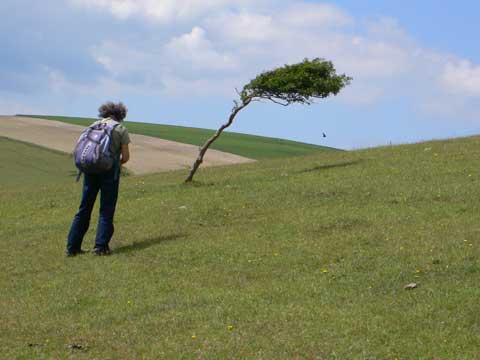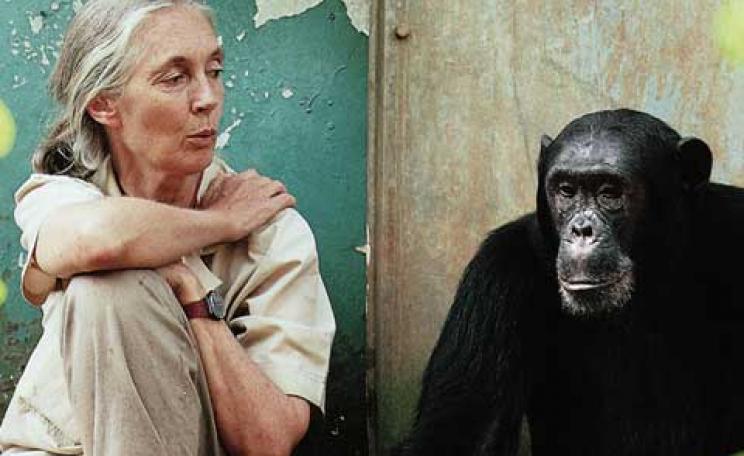Action for Access: campaigning for the right to roam
On a warm June afternoon, while the rest of the nation clamours at TV screens as balls are kicked into nets, 50 people have gathered on a sun-soaked, buttercup-strewn hillside to erect their own posts and string around a little patch of land. Flags and banners go up, and there is whooping and cheering.
But this isn't a mini, World Cup-inspired football tournament. This is Action For Access (A4A), a feisty bunch of South Downs-based walkers and nature-lovers whose members range from 5 to 75 years old.
Determined to defend their right to enjoy the countryside, they have 'trespassed' onto the slope facing Breaky Bottom Vineyard in East Sussex, which, despite acquiring statutory Access Land status in 2000 under the Countryside Rights of Way (CRoW) Act and its attached Right to Roam, is currently out-of-bounds to the public due to the landowner's claim that a small, disused chalk-pit constitutes a safety hazard.

'All that's needed is 70 metres of fencing,' says A4A's founder, Dave Bangs. 'But this selfish landowner is using the quarry as an excuse to exclude us from his grounds. The irony is, he's enclosed every other vine row, paddock or field on the site, making this the most fenced farm on the South Downs. Natural England should have refused the restriction order, and Lewes District Council should be enforcing his duty to install a safety barrier. So today we've symbolically fenced off the pit ourselves, to show the farmer and these two bodies that our exclusion from this delightful piece of ancient Downland won't go unchallenged.'
 And delightful it certainly is. With the grass whirring and leaping with Wart-biter crickets and Common Blue butterflies, and playing host to myriad wildflowers including the rare Red Star Thistle, this south-facing slope - a scarcity on the South Downs - is big on biodiversity, and feels truly remote, despite its proximity to busy Brighton and Newhaven.
And delightful it certainly is. With the grass whirring and leaping with Wart-biter crickets and Common Blue butterflies, and playing host to myriad wildflowers including the rare Red Star Thistle, this south-facing slope - a scarcity on the South Downs - is big on biodiversity, and feels truly remote, despite its proximity to busy Brighton and Newhaven.
A big issue
Unfortunately, its segregation isn't a one-off, small-scale occurrence. As well as being one of the most species-rich and tranquil spots on the South Downs, Breaky Bottom is emblematic of an issue that's affecting numerous tracts of land across the country - particularly in the South, where most of the UK population live.
Bangs believes that, while the CRoW Act has really helped western and northern upland regions, it has made little difference in lowland Britain - in other words, most of Southern England. The Act granted access on foot to designated areas of 'mountain, moor, heathland, downland and registered common land', but with the proviso that these must be 'unimproved' sites - ones which retain their original characteristics and have not been chemically or physically altered by agribusiness.
 'This landscape has been completely trashed by plough-ups and pesticides over the past 150 years - and most sharply since World War II - so the few remaining plots of unimproved pasture are very scarce indeed,' he explains.
'This landscape has been completely trashed by plough-ups and pesticides over the past 150 years - and most sharply since World War II - so the few remaining plots of unimproved pasture are very scarce indeed,' he explains.
Breaky Bottom is one of these precious fragments, yet many equally beautiful but formerly farmed sites lost out when Access Land was assigned, due to this restriction. A4A are thus arguing for the CRoW act to be amended to apply to all areas of permanent pasture, not just those which qualify as 'unimproved'.
Although the group only formed two years ago, Bangs has, true to his name, been banging on about this stuff for decades. Growing up in an age-old Sussex family, his mother's tales of rambling 'for miles on the soft turf, with only the smell of thyme and the skylarks singing overhead' instilled in him a deep love of the natural world, and a passionate belief that all should be free to enjoy it.
This socialist approach to the countryside later saw him founding land-rights pressure group The Land is Ours with George Monbiot in 1995, and co-organising several mass trespasses in the late 1990s.
As things currently stand, 80 per cent of the 'urban fringe' Downland that surrounds Bangs' hometown of Brighton still has no public right of access, and only a pitiful 2 per cent of the overall South Downs region increased in accessibility after the CRoW Act was passed. Yet surely its new status as a National Park (which took effect this March) will bring changes? 'I wouldn't bet on it,' he says. 'While there are many positives to becoming a National Park, the new authority's powers are very constrained, and it doesn't have direct control of access arrangements.'
A public landscape
Bangs himself refuses to be constrained however, and his irrepressible desire to regain 'a public landscape' through peaceful - though well-argued - protest has won him support from members of organisations as diverse as the Ramblers' Association, Open Spaces Society, Greens, Conservatives, Lib Dems and Labour Party.
Of course, it's the general public who interest him most: 'The vast majority of our population lives cooped up in towns and cities, alienated from nature. A4A aims to reconnect people with that lost landscape, and to create an army of folk to address the access problems. We need to democratise and extend ownership of the countryside so that people can really be involved in all the choices and opportunities it offers.'
In 2008, Bangs put these ideals in print with his Freedom to Roam Guide to the Brighton Downs, an extensive volume relating the history, wildlife and legal position of the locality, as well as a lovingly detailed site-by-site guide to its every field and furrow. Through his lively, distinctive style - there are hand-drawn maps, childhood anecdotes, and even poems - he encourages readers to veer away from pre-determined paths and instead 'try stepping inside [the] unvisited and unknown'.
How to campaign for access
Today at Breaky Bottom, as he points out a Burnet moth cocoon and enthuses over the site of an Ice Age river cliff, his staggering knowledge of this terrain is in evidence, as is his zest for preserving it. To other would-be defenders of Britain's open country, he advises: 'Start by identifying vulnerable sites [whether this is due to the limits of the Access Land classification system, or individual landowners exploiting loopholes], document your visits to them, and report any rare species sightings.
'Then, campaign for them! Join your local wildlife group and harass your local council. Bring others to see what you're on about, and spread the word. Make it clear that public access does not damage the landscape - many areas, like the Downs' chalk grassland, actually benefit from human footfall. And more walkers are infinitely better than further degradation by private landowners, farmers and developers.'
With the UK's population continually rising, development is indeed a constant threat to our countryside. Pressuring local authorities and statutory agencies like Natural England to grant or enforce Access Land status is one way we can retain these special places - what Bangs calls 'our common treasures' - for generations to come. Now that's a goal worth making a noise about.
A4A's next walk is at Amberley Downs, West Sussex on Sat 24 July. For more info, email action4access@googlemail.com
A Freedom to Roam Guide to the Brighton Downs is available at www.brightondowns.co.uk
Colette Bernhardt is a freelance journalist
| READ MORE... | |
 |
GREEN LIVING Where am I? The world beyond sat-navs Maps have lost their initial purpose of orientating lost travellers. Today they mean much more: they are tools to help re-connect us to the natural world, writes Trevor Critchley |
 |
GREEN LIVING Why working holidays on organic farms help you see the world anew WWOOF (World Wide Opportunities on Organic Farms) is not just a cheap way to see the world - it's a hands-on way to learn new skills of sustainable living |
 |
HOW TO MAKE A DIFFERENCE How to get involved in wildlife conservation From joining campaigns groups to making your garden more wildlife friendly, there are many ways to get involved with saving the natural world. Read on for inspiration... |
 |
GREEN LIVING Going with the flow Financial slowdown? What about a holiday to match? Eifion Rees ditches the nine-to-five in favour of a stress-busting canoe trip down the river Thames. |
 |
GREEN LIVING An industrial antidote: yurts and Wordsworth in the Lakes A yurt holiday near Wordsworth's ancestral home offers a chance to discover the Lake District's powerful beauty |





